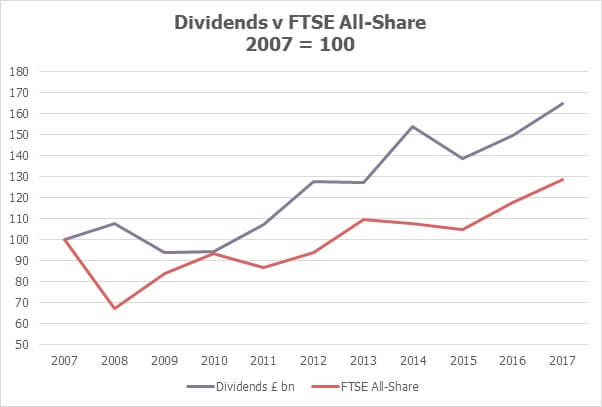UK dividends are continuing to grow faster than inflation, according to the latest quarterly data from Link Asset Service.

Source: Link Asset Services, FTSE
The latest UK Dividend Monitor (UKDM) shows that in the third quarter of 2018 dividend payments were 4.1% up on the previous year, comfortably above the current rate of inflation. Looking over the 10-year period from the end of 2007 to the end of 2017, total dividend payments have risen by an average of 5.1% while CPI inflation has averaged 2.4%.
The UKDM is published by Link Asset Services (formerly produced by Capita) and totals the dividends paid out on the ordinary shares of companies listed on the UK Main Market every quarter – excluding investment companies, to avoid double counting. It captures both regular dividends and one-off special dividends, which often stem from takeovers or other corporate restructurings.
As the graph shows, over the last ten years, the amount paid out in dividends has grown faster than the capital value of shares. There are still dips, but between 2007 and 2017 the regular dividend total dropped only once, in the wake of the global financial crisis. The jump and dive between 2013 and 2015 is an aberration caused by a one-off £15.9 billion special dividend paid by Vodafone in 2014.
Unpredictable markets
Despite increasing dividend payments, there has been considerable volatility in UK share prices throughout 2018. Little more than five months, and over 1,000 points, separate the FTSE 100’s high and low marks for the year to date. But whilst the FTSE tracks capital values, it does not account for dividends, which are ignored in the calculations of most equity market indices.
If you are investing for income the data is a reminder that, for all the fluctuations in capital values, shares have continued to provide real dividend growth.
For more information about our investment service click here
The value of your investment can go down as well as up and you may not get back the full amount you invested.
Past performance is not a reliable indicator of future performance.
Investing in shares should be regarded as a long-term investment and should fit in with your overall attitude to risk and financial circumstances.
Content correct at time of writing and is intended for general information only and should not be construed as advice.
